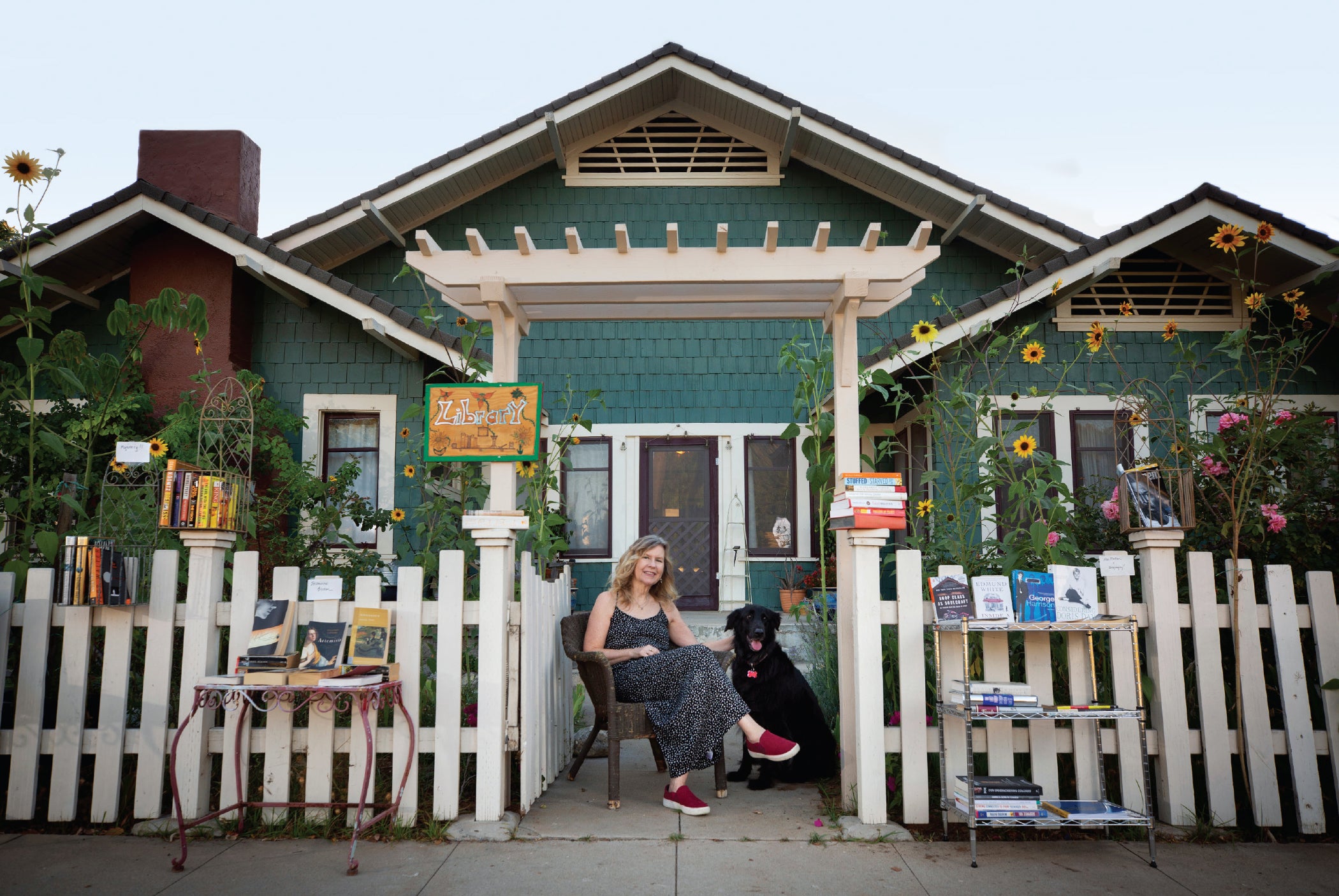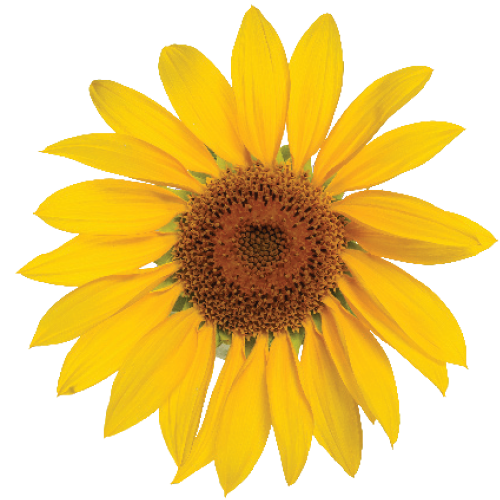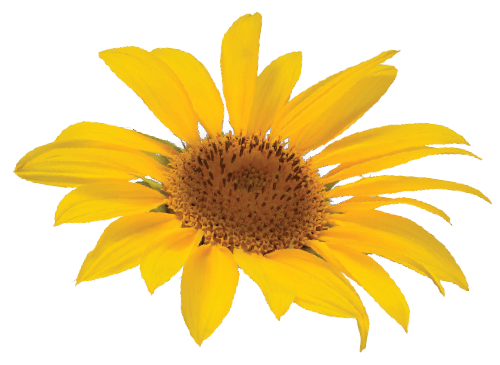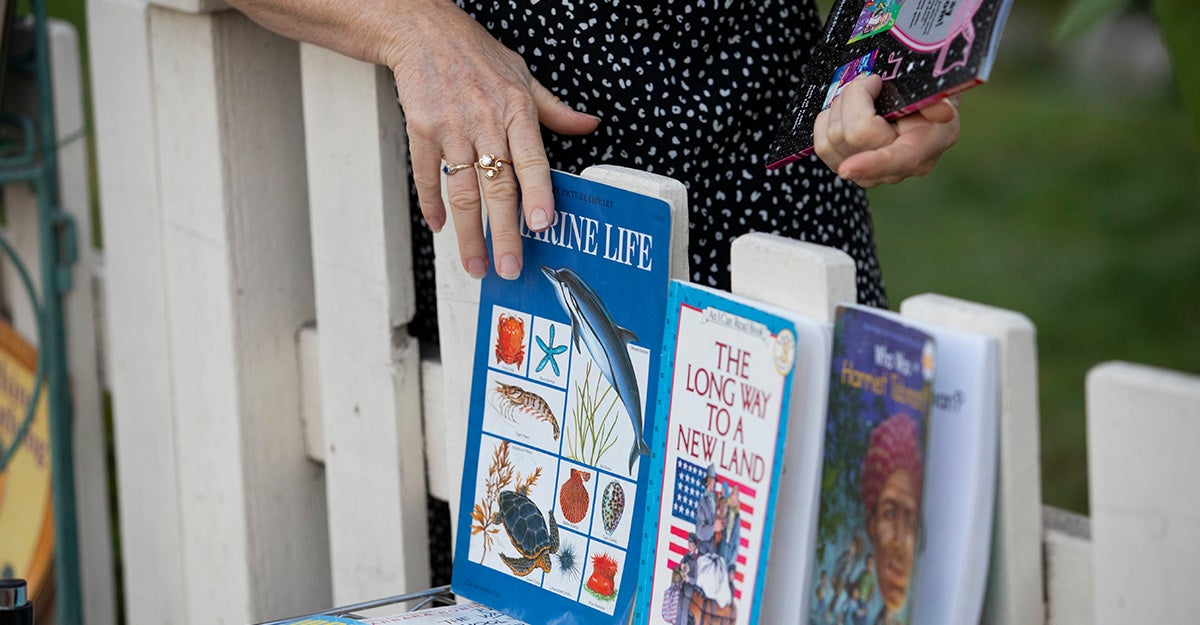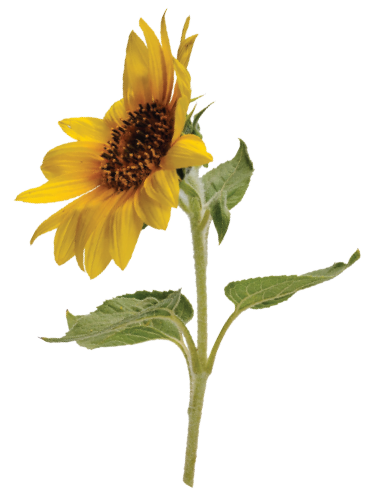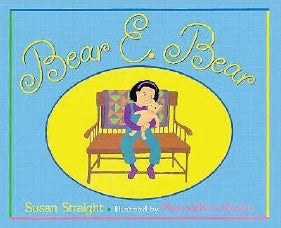CHECK IT OUT
UCR author Susan Straight’s fence library has brought her Riverside neighborhood together during the pandemic.
By Jessica Weber
Photos by Stan Lim
On March 17, during the first week of school closures across California, author Susan Straight was doing what she does most days — hanging out on her front porch communing with neighbors. A Riverside native, she has lived on the same bustling street corner for over 30 years, her home often serving as a gathering place for a tight-knit neighborhood. Her neighbors, many teachers at local schools and parents of small children, were at a loss as to what to do with no school, no libraries, and for many in her area, no computers or internet. Straight, a distinguished professor of creative writing and author of eight novels, describes her community as one of barter, where neighbors trade bags of oranges for tools and fresh-caught fish. She realized that day, as many fretted over the shutdown, the most valuable thing she had to offer was books — and she had hundreds.
“I had all these books in the house — there’s books everywhere,” she said. “I went to my kids’ bedroom, and there was this little wrought-iron bookshelf, and I put it outside with some tiny end tables. I put kids books out the first day and a sign that said, ‘Free Books, Fence Library 2020.’ That was the beginning of it.”
It wasn’t long before Straight had expended her personal collection of books and had to reach out to friends to keep shelves stocked for the neighborhood kids and parents who had begun to frequent the library.
“A couple people came by and started dropping off books, and I was able to put out more books and more people saw it,” she said. “That’s when it kind of took off.”
A diverse array of books and magazines — biographies, gardening books, copies of US Weekly and InStyle — began rolling in. Friends provided more tables and repainted bookshelves, a neighbor built an arbor and hand painted a new sign, and the fence library continued to stretch down the sidewalk now sustained by both Straight and the community it served.
Among her biggest supporters have been fellow UC Riverside community members, Straight said. Viviane Baerenklau, former academic advisor for the Department of Creative Writing, contributed several boxes of children’s picture books and young adult fiction early on and continues to supply donations. Bryan Bradford, coordinator of UCR’s creative writing MFA program and Straight’s neighbor, donated a box of novels, poetry, nonfiction, and children’s books. Geoff Cohen, former director of CHASS F1RST: First-Year Experience Programs; and his wife Katherine Kinney, a professor of English at UCR; donated many children’s books including chapter books, science fiction novels, and books featuring children and people of color. Alumna Carole Nagengast ’74, M.A. ’79, whose husband Michael Kearney taught anthropology at UCR for 40 years, supplied Straight with three cartons of used kids books originally collected by the Riverside-Moreno Valley branch of the American Association of University Women for a children’s book project. She noted many books could not be accepted by local school districts due to the pandemic, and several more cartons have been reserved for Straight’s library once there is room.
Susan Straight organizes books in her library. (UCR/Stan Lim)
“Aside from books I just bought from the dollar store, now it’s totally donations,” Straight said. “I was completely out of books, especially children’s books. I ran out long ago, and people like Viviane and Bryan completely saved me.”
Months later, the fence library continues to grow in popularity. Nearby neighbors come by each day to chat and peruse, while others drive in weekly during trips to nearby Little Free Libraries. Homeless residents come by for books late at night, and new donations appear on tables early in the morning. By Straight’s estimates, 100 to 150 books are gone each week along with the countless magazines snatched up as soon as they’re set out. Straight’s favorite thing has been choosing the right books for each person who comes by, noting the library has allowed her to meet some neighbors for the first time. She said it has also led to many deeply personal and profound conversations with passersby trading their stories for books.
“I really think that COVID is stratifying our society even more,” Straight said. “I have neighbors that come by all the time, and they have no air conditioning, no internet, and no devices. I have never missed a day putting the books out. Even if I’m super tired or discouraged, it’s the thing I do when I wake up, because it reminds me of being a kid and not having any money and going to the bookmobile.”
Straight said the fence library won’t fill any gaps in education for kids without access to necessary technology and assistance, but it does provide a place for community and a comfort only books can offer. Parents share how they’ve been sitting down together to read picture books to their children each night. A father and son pair walk by every day to pick a new book. For that reason, she continues to set books outside each day, picking out the perfect titles for visitors with the help of her trusted assistant librarian, her dog Angel.
“People forget that there’s still an entire group of us that still grows our own food, reads books in our hands, and talks over the fence,” Straight said.
A Personal Favorite
“Bear E. Bear” By Susan Straight, Illustrated by Marisabina Russo, 1995
“I never tell anyone I’m an author,” Straight said. “But I ran out of children’s books early on and put out copies of the children’s picture book I published, featuring my older daughters Gaila — and her bear — and Delphine at 1 year old stealing the bear and throwing him in the mud. Gaila watches the bear in the washing machine, nervous. They are clearly brown girls, with a tall black dad and a short blonde mom, a black grandmother and a white grandmother, and cousins of mixed race. That book disappeared every time, so I’ve given away about 20 from my last box. I received cards from families in the neighborhood saying that book is the first time their own mixed-race children saw themselves in a book, and they read it every night. I keep the cards on my desk to remind me why we write.”
